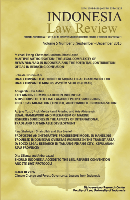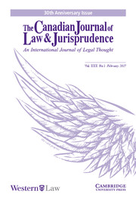
DUKE LAW JOURNAL
Scope & Guideline
Cultivating diverse perspectives in legal studies.
Introduction
Aims and Scopes
- Administrative Law and Governance:
The journal frequently addresses issues related to administrative law, focusing on regulatory frameworks, the role of administrative bodies, and the implications of administrative practices on governance. - Civil Rights and Social Justice:
A significant emphasis is placed on civil rights, with discussions surrounding systemic inequality, race, gender, and the impact of laws on marginalized communities. - Legal Theory and Constitutional Law:
The journal explores foundational legal theories, constitutional interpretations, and the evolution of legal principles, particularly in relation to contemporary societal challenges. - Technology and Law:
The intersection of technology and legal practices is a growing area of focus, examining how innovations impact legal frameworks, privacy, and regulation. - Environmental Law and Policy:
Environmental issues are frequently discussed, particularly in the context of regulatory responses to climate change and sustainable practices. - Corporate and Securities Law:
Corporate governance, securities litigation, and the implications of financial regulations are core areas of inquiry within the journal. - International Law and Human Rights:
The journal also delves into international legal norms, human rights issues, and the role of law in global contexts.
Trending and Emerging
- Environmental, Social, and Governance (ESG) Issues:
There is a growing focus on ESG topics, particularly in relation to corporate accountability and investor trust, reflecting a broader societal concern about sustainability and ethical governance. - Administrative Reforms and Democratization:
Emerging discussions around the democratization of administrative law indicate a trend towards making governance more accountable and transparent, addressing public reliance on administrative bodies. - Technology and Algorithmic Governance:
As technology continues to advance, legal scholarship is increasingly examining the implications of algorithms and AI on governance, liability, and individual rights. - Racial Justice and Systemic Inequality:
The journal shows a heightened focus on racial justice, exploring systemic inequalities within legal frameworks and advocating for reforms to address these disparities. - Health Law and Policy:
There is an increasing trend towards health law, particularly in the context of public health emergencies, emphasizing the need for legal frameworks that can adapt to health crises.
Declining or Waning
- Traditional Intellectual Property Rights:
There has been a noticeable decline in articles focusing solely on traditional intellectual property rights, such as patents and copyrights, suggesting a shift towards broader discussions on technology and innovation. - Criminal Law and Procedure:
The frequency of publications specifically addressing criminal law and procedural issues has decreased, indicating a potential waning interest compared to other emerging legal fields. - Historical Legal Analysis:
Themes centered on historical legal analysis and retrospective examinations of legal doctrines appear to be less prevalent, as the journal focuses more on contemporary issues. - Legal Education and Pedagogy:
Discussions surrounding legal education, curriculum development, and teaching methodologies seem to be diminishing, reflecting a broader trend towards practical and applied legal scholarship. - International Trade Law:
The emphasis on international trade law has decreased, possibly due to shifting focuses towards domestic regulatory frameworks and their implications.
Similar Journals

Indonesia Law Review
Advancing Legal Knowledge in Indonesia and BeyondIndonesia Law Review is a premier open-access academic journal dedicated to advancing knowledge in the fields of law and social sciences, with particular emphasis on the Indonesian legal landscape. Established by the Indonesian Law Review, this journal has made significant strides since becoming open access in 2014, ensuring that research is freely available to a global audience. Based in Depok, West Java, the journal seeks to foster scholarly discourse on legal issues pertinent to Indonesia, while also contributing to the broader field of education and social sciences. With its current Scopus rankings placing it within the top tiers of law and social sciences, including a Q3 categorization in law and a Q4 classification in education and miscellaneous social sciences, the **Indonesia Law Review** serves as a vital platform for researchers, professionals, and students to disseminate their findings and engage with contemporary legal dilemmas. The journal is committed to providing a robust forum for innovative legal scholarship and is an essential resource for anyone seeking to understand the complexities of law in Indonesia and beyond.

Melbourne University Law Review
Fostering Rigorous Debate in LawMelbourne University Law Review, published by the MELBOURNE UNIV LAW REVIEW ASSOC, stands as a pivotal journal in the realm of legal scholarship in Australia and beyond. With an ISSN of 0025-8938 and an E-ISSN of 1839-3810, this esteemed publication has been a cornerstone for legal discourse since its inception. Designed to foster rigorous analysis and extensive debate, the journal covers diverse aspects of law, providing researchers, practitioners, and students an invaluable platform to engage with contemporary legal issues. The journal has demonstrated a commitment to high-quality scholarship, achieving a Q2 ranking in Law for 2023, further solidifying its importance within the academic community. Although not an open-access publication, the Melbourne University Law Review ensures that contributions remain accessible through institutional subscriptions, enhancing its reach and reinforcing its role as a critical resource for those dedicated to advancing legal knowledge and practice. For all stakeholders in the field of law—be they established academics or emerging professionals—this journal serves as a vital repository of innovative ideas and legal analysis.

YALE LAW JOURNAL
Pioneering Insights in Legal ScholarshipYale Law Journal, founded in 1891 and published by Yale Law J Co Inc, stands as a preeminent peer-reviewed legal journal in the United States, recognized for its rigorous scholarship and influential contributions to legal theory and practice. With an impact factor that underscores its peerless reputation, this journal maintains a Q1 ranking in the law category, situating it in the top tier of legal publications globally, as indicated by its Scopus rank of 66 out of 1025, placing it in the 93rd percentile. The journal publishes a comprehensive range of articles, essays, and reviews that address vital topics across the legal spectrum, aiming to foster dialogue and innovation within the legal community. Although it does not offer open access, its meticulous curation of content ensures that researchers, practitioners, and students alike have access to the most impactful legal scholarship. Located at 401-A Yale Station, New Haven, CT 06520, the journal continues to shape the legal landscape, making it an essential resource for anyone engaged in the study or practice of law.

Canadian Journal of Law and Jurisprudence
Decoding Legal Complexity Through Canadian PerspectivesCanadian Journal of Law and Jurisprudence, published by Cambridge University Press, serves as a pivotal platform in the field of legal studies, particularly recognized for its comprehensive exploration of jurisprudence in the context of Canadian law. While the journal operates without an open access model, its ISSN 0841-8209 and E-ISSN 2056-4260 ensure broad academic accessibility. Based in the United Kingdom, it has established a notable impact within its category, maintaining a Q3 ranking in Law according to the latest 2023 metrics. With its convergence of issues from 1996 to 2003, periods in 2007, and recently from 2012 to 2024, the journal embraces a rich historical context while addressing contemporary legal challenges. Ranked #439 out of 1025 in the social sciences category on Scopus, the journal is positioned within the 57th percentile, highlighting its significance and influence in legal scholarship. Aimed at researchers, professionals, and students, the Canadian Journal of Law and Jurisprudence is an essential resource for those seeking to deepen their understanding of the evolving landscape of law and its philosophical underpinnings.

De Jure Law Journal
Exploring the Depths of Law and Legal Principles.De Jure Law Journal, published by Pretoria University Law Press, is a reputable open access journal that has been serving the legal community since its establishment in 2011. With its commitment to disseminating high-quality research, this journal focuses on various aspects of law and legal principles, encompassing a broad range of topics from constitutional law to international legal frameworks. The journal's ISSN 1466-3597 and E-ISSN 2225-7160 ensure that it is easily accessible and widely recognized in academic circles. Positioned as a significant contributor to legal scholarship in South Africa and beyond, De Jure Law Journal is dedicated to fostering a critical dialogue among researchers, practitioners, and students alike, making it an essential resource for anyone engaged in legal studies.

TEXAS LAW REVIEW
Where Tradition Meets Innovation in LawTEXAS LAW REVIEW, an esteemed legal journal published by TEXAS LAW REVIEW PUBL INC, stands as a pivotal resource in the field of law, contributing significantly to legal scholarship since its inception. With an ISSN of 0040-4411 and an E-ISSN of 1942-857X, this journal is recognized for its rigorous analysis of pressing legal issues and case law, making it essential reading for legal practitioners, scholars, and students alike. Positioned in the Q2 category for Law (2023), and ranked 343 out of 1025 in the Scopus database, TEXAS LAW REVIEW holds a commendable 66th percentile, highlighting its influence among legal publications. While it does not offer open access, the journal ensures that its high-quality articles are accessible to a wide range of legal audiences. Based in Austin, Texas, the journal's continuous evolution since 1977 reflects its commitment to adapting legal discourse to contemporary challenges, thereby cementing its status as a vital platform for those dedicated to understanding and shaping the legal landscape.

GEORGE WASHINGTON LAW REVIEW
Advancing Legal Scholarship with ImpactThe George Washington Law Review, ISSN 0016-8076, published by George Washington University, stands as a leading academic journal in the field of law, distinguished by its prestigious Q1 category ranking in Law for 2023. Established as a pivotal platform for legal scholarship, the journal reflects a deep commitment to advancing legal discourse through the publication of rigorous, thought-provoking articles and analyses. The journal's impact is further underscored by its Scopus ranking, placing it in the 72nd percentile within the Social Sciences category for law, showcasing its relevance and influence in legal academia. While not an open-access journal, it contributes significantly to legal research and education, making it invaluable for scholars, practitioners, and students seeking to engage with contemporary legal issues. Its comprehensive coverage since 1976 ensures a wealth of resources dedicated to evolving legal thought and practice, solidifying its role as an essential resource within the legal community.

UNIVERSITY OF NEW SOUTH WALES LAW JOURNAL
Pioneering Perspectives in Law and Related DisciplinesUniversity of New South Wales Law Journal, published by the University of New South Wales, Faculty of Law, is a leading academic journal that serves as an essential platform for discourse in the field of legal studies. With an ISSN of 0313-0096 and an E-ISSN of 1839-2881, the journal has been a beacon of legal scholarship since its inception in 1983. Operating from Kensington, New South Wales, Australia, it provides profound insights into various legal issues, emphasizing interdisciplinary perspectives by also being recognized in the fields of philosophy, sociology, and political science. While it maintains a Q3 ranking in Law and has shown increased visibility in Philosophy at Q2 according to the 2023 category quartiles, the journal assures a diverse range of critical analyses from scholars, professionals, and students alike. It is particularly valuable for researchers seeking to engage with contemporary legal debates, ensuring they remain at the forefront of academic and practical discussions in law and related disciplines.

FORDHAM LAW REVIEW
Charting New Territories in Legal ResearchFORDHAM LAW REVIEW is a prestigious legal journal published by Fordham University, School of Law, based in the United States. Established to disseminate cutting-edge legal scholarship, this journal has consistently achieved an impactful standing within the field, evidenced by its category ranking as Q1 in Law for 2023 and its Scopus ranking of #428 out of 1025 in the Social Sciences Law category, placing it in the 58th percentile. The journal welcomes submissions across diverse legal topics, fostering discourse that advances both legal theory and practice. Although it does not currently offer open access options, the Fordham Law Review serves as a vital resource for scholars, practitioners, and students seeking insights into contemporary legal challenges and developments. With its rich publication history dating back to the converged years of 1973 through 2024, the journal continues to be a cornerstone for rigorous legal analysis and a platform for influencing the evolution of law.

Istanbul Hukuk Mecmuasi
Connecting scholars and practitioners in the legal arena.Istanbul Hukuk Mecmuasi, published by ISTANBUL UNIV, FAC LAW, is a leading open-access journal dedicated to advancing the field of law since its establishment. With the ISSN 2636-7734 and E-ISSN 2667-6974, this journal serves as a pivotal platform for legal scholars, practitioners, and students to disseminate and access high-quality research and discussions on various aspects of law, including constitutional, private, and international law. Emphasizing accessibility, it has been providing open access to its publications since 2017, thereby promoting broader engagement and collaboration within the legal community. The journal aims to foster scholarly discourse and serves as an invaluable resource for those seeking to deepen their understanding of contemporary legal challenges in both a national and international context. With its commitment to high academic standards, Istanbul Hukuk Mecmuasi is the go-to journal for research that influences legal theory and practice.